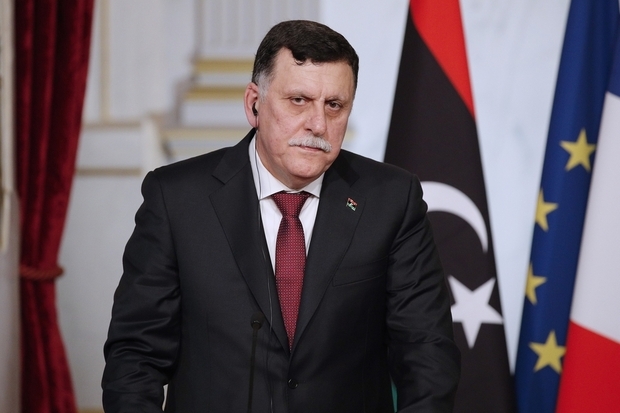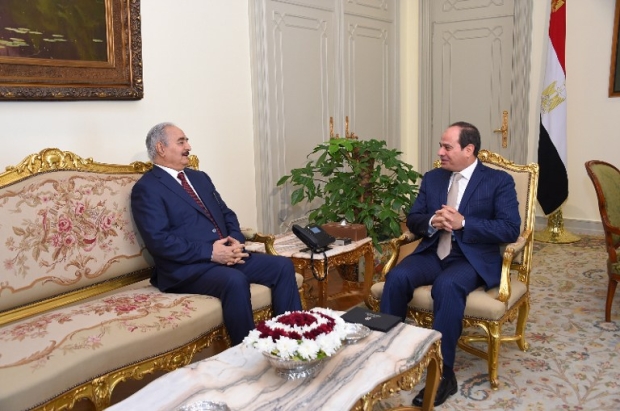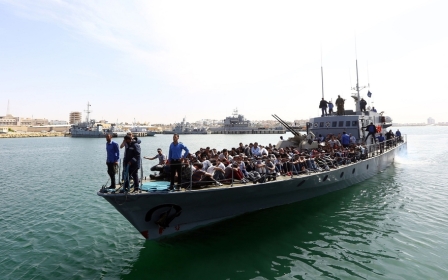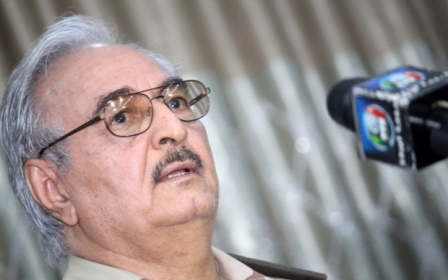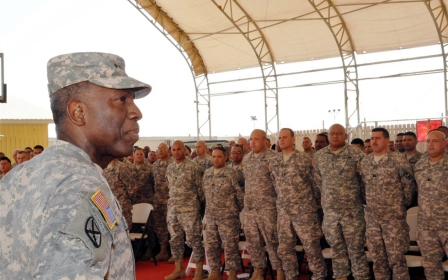A new recipe for Libyan civil war
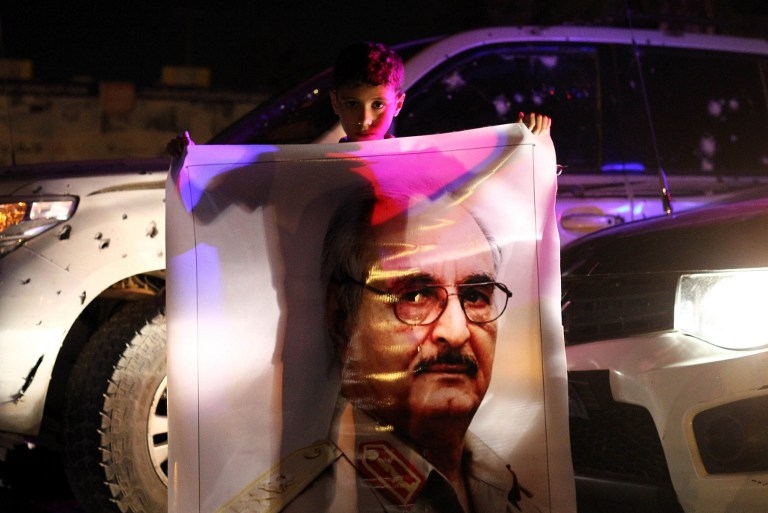
In the last few months, the implementation of the UN-backed Libyan Political Agreement (LPA) has stalled while violence slowly escalated and economic collapse accelerated.
Unsurprisingly, optimism soared among diplomats and policymakers when news came out of an Emirati-brokered meeting on 2 May held in Abu Dhabi between Fayez Serraj, head of the UN-backed and Tripoli-based Presidency Council, and Khalifa Haftar, the “field-marshall” who heads a rival administration in the country’s east.
Hours after the meeting, contents of a supposed deal started to leak in the Arabic press including all or some of the following elements:
- A new, smaller Presidency Council of three (down from the current nine members) including Serraj, Haftar and his political arm, the speaker of the House of Representatives, Aghila Saleh
- Haftar’s acceptance of civilian oversight by this body in exchange for him remaining as head of the army
- A quick path towards new presidential and parliamentary elections to be held early in 2018
- The listing as terrorist organisations of groups such as the Benghazi Defence Brigades which are close either to Serraj’s minister of defence, Mehdi Bargathi, or to important backers of his government
The prime minister and the field marshall were reportedly meant to have agreed to finalise the deal only one week later in Cairo, with the blessing of Egyptian President Abdel Fattah al-Sisi.
Consequences of the deal that never was
Except there was no such deal. The leaks, mostly launched on news outlets close to Gulf countries or Egypt, reported Haftar’s negotiating positions, not an agreement between the two.
Serraj’s press office took 24 hours to publish a statement in which there was only talk of an agreement on a ceasefire in the country’s south (where Haftar and militias from Misrata, nominally loyal to Serraj, have been fighting for months) and a peaceful transfer of power.
In most Western and regional capitals, there was talk of a “breakthrough” and of the need to accelerate the political process to include Haftar in the LPA and hold elections in a few months. A new emerging consensus focuses on accelerating the political process through a meeting of delegations from the House of Representative and the Tripoli-based High Council of State and a roadmap for parliamentary and presidential elections. The plan could then be endorsed by the UN at its highest levels.
In Tripoli and Mistrati, however, the Abu Dhabi meeting and its aftermath received a diametrically opposite reaction. It was these western cities that formed the pillars of the LPA from its signing in December 2015 and where hardliners got on a I-told-you-so footing, regrouped and further complicated the life of moderates.
It is now clear that Serraj lacks the power base to make a deal with Haftar on the field marshall's conditions
Tensions ran high in Tripoli with most militias distancing themselves from the supposed contents of the deal. These political tensions overlapped with growing enmity between the militias from Tripoli and those from Misrata, some of the latter also being based in the capital, leading potentially to a shift in the power balance between militias backing Serraj and those aligned with the rival - Misratan-dominated - National Salvation Government (NSG).
NSG-aligned groups have been mostly marginalised in Tripoli following fighting and a ceasefire in mid-March, but they are now using the Abu Dhabi meeting to get back into the capital.
In a meeting held last week in Tripoli with 45 members of the House of Representatives, Serraj downplayed the contents of the summit with Haftar and tried to reassure MPs that he was not going to finalise any deal in Cairo.
To close observers of developing events in Tripoli, it is now clear that Serraj lacks the power base to make a deal with Haftar on Haftar’s terms and that, should he decide to go ahead with the negotiations, he probably would not be able to get back to Tripoli.
Haftar’s new plan - and back up one
Even though no deal was made in Abu Dhabi, the meeting is nonetheless highly significant because it shows Haftar’s change of strategy.
After heavy pressure from his regional backers in Cairo and in the UAE, he has abandoned his claim that there is no point in negotiating with Serraj as long as he’s supported by what the field marshall sees as radicals in cahoots with terrorists.
Haftar’s new strategy is to abide by a reformed LPA with solid guarantees on his role as both military and civilian leader while pushing to have presidential elections early in 2018. The anti-Islamist former general would run in those elections as his moves to recruit campaigners throughout the country indicate.
But his plan could face many hurdles. To hold presidential elections, the current draft constitution would need to be hastily approved both by parliament and in a referendum, given that existing legislation does not include a directly elected head of state.
The laws regulating both the referendum and the elections would have to be approved by the House of Representatives, but this would require high quorums and high attendance, both of which have been largely missing in the last two years.
Yet, all these hurdles could be cleared should there be an international consensus to approve the constitution and go to elections.
However, this consensus and the momentum created by the Abu Dhabi meeting could not clear the biggest hurdle for Haftar, namely the impossibility for him to enter Tripoli peacefully given the almost unanimous opposition to him from armed groups and his lack of manpower to wage war in the capital.
And here comes Haftar’s plan B. To one of the many senior international officials who visited him recently and who asked about the Tripoli problem, Haftar replied swiftly that controlling Tripoli is not necessarily his priority.
Instead, being the elected president of Libya, or even just being one of the three members of its Presidency Council, Haftar could ask for international help to fight his enemies in Tripoli while setting up his capital either in Jufra (where a lot of fighting has been going on for months) or even in Benghazi, where some institutions like the House of Representatives are meant to be even according to existing laws.
Antidote against civil war
Ultimately, Haftar’s plan is not to abandon war to enter politics, but rather to use politics to strengthen his hand in a military battle that he knows he can’t win under current circumstances. For him, war is not the continuation of politics by other means, but rather the other way around: politics is a way to expand his support base and continue fighting.
For Haftar, war is not the continuation of politics by other means, but rather the other way around: politics is a way to expand his support base and continue fighting
Europeans and Americans should think twice before accelerating negotiations that could lead not to peace but to renewed fighting as an empowered and legitimised Haftar would clash against well-armed militias in western Libya.
The current draft of the constitution was not the result of a wide consultation and could prove controversial. Elections, provided they could be free and fair - which is a huge question mark in today’s Libya - have already proven a driver of escalation in 2014. The risk is that instead of having ballots replace bullets, we could again have (mostly empty) ballots preceeding more bullets.
To his numerous foreign visitors, Haftar has said over and over that he’s not ready to accept civilian oversight. His offer in Abu Dhabi is to be the head of the military and its civilian commander, all in one person and at the same time.
Unless he changes his mind, Europeans and Americans should pursue a stabilisation strategy that, while keeping the door open for a political process, focuses instead on having a more functional government in Tripoli capable of delivering to Libyans what they’ve yearned for a long time: basic security, cash, functioning public services.
Europeans, in particular, should support Libyans who are working on an economic agreement to share oil wealth and eliminate one of the main drivers of the conflict along the lines described here.
A stabilisation plan is surely less attractive than a “peace deal” for policy-makers set on a short-term perspective and keen to have “announcables” rather than actual deliverables. But it is time to call the Egyptian-Emirati bluff: a deal under these conditions would be the recipe for more civil war, not less.
- Mattia Toaldo is Senior Policy Fellow at the European Council on Foreign Relations.
The views expressed in this article belong to the author and do not necessarily reflect the editorial policy of Middle East Eye.
Photo: A Libyan boy holds a portrait of Khalifa Haftar as people celebrate the decision by their parliament to reject the UN proposals for a national unity government, in a public square in Benghazi late on 19 October 2015. (AFP)
New MEE newsletter: Jerusalem Dispatch
Sign up to get the latest insights and analysis on Israel-Palestine, alongside Turkey Unpacked and other MEE newsletters
Middle East Eye delivers independent and unrivalled coverage and analysis of the Middle East, North Africa and beyond. To learn more about republishing this content and the associated fees, please fill out this form. More about MEE can be found here.



